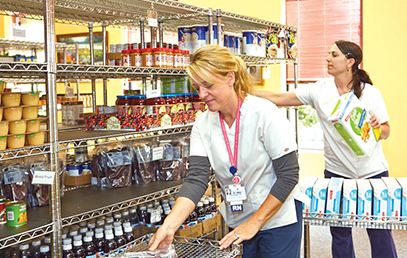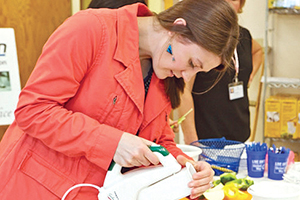By BETSY TAYLOR
When six community assistance agencies in a rural, north-central Wisconsin town with a population of 10,000 started fundraising last year for a new roof for the building they were located in, they only raised about 25 percent of their $100,000 goal. Ministry Good Samaritan Health Center in Merrill, Wis., proposed a solution. It had room under its roof.

Nurses Tricia Draeger, left, and Jamie Turner stock the shelves at the Merrill Community Food Pantry, which is among the organizations that have moved into a building on the grounds of Ministry Good Samaritan Health Center in Wisconsin. Draeger and Turner are manager and supervisor, respectively, of the health center's patient care services.
The critical access hospital invited all of the agencies to move into a building with empty space, rent-free on its campus. It offered to cover the costs of the agencies' utilities and maintenance, thereby saving the organizations an estimated total of $30,000 annually — money that the organizations could instead devote to client needs.
"It was such a blessing for us," said Denis McCarthy, conference president for the Society of St. Vincent de Paul in Merrill. The building, now known as the Menard Resource Center, is more spacious than the agencies' previous location. It has also allowed for some innovative programs to help the poor and hungry in the area because community organizations have collaborated on some new offerings since they relocated to the center.
In addition to the St. Vincent de Paul Society outreach office, the Merrill Area United Way, the Merrill Community Food Pantry, the Merrill Salvation Army, the North Central Community Action Program, and Comunidad Hispania moved their operations to the hospital building. Comunidad Hispania provides health care, social services and educational services to immigrant and low-income residents. Another area organization, the Bridge dental clinic, plans to relocate to the building in September.
Jane Bentz, director of the Ministry Good Samaritan Health Center Foundation and community outreach, said, "It's very much a one-stop shop, conveniently in one location."
The Menard Resource Center still houses the hospital's physical and occupational therapy programs, a dialysis center and a blood bank.
Bentz said she thinks combining services on the health care campus reduces the stigma of seeking help in a town of 10,000. If someone sees a neighbor, they don't know if the person is on site for a doctor's visit, to donate blood or because they're in need of food, utility support or other assistance. Jackie Frombach, director of patient care services and operations for Ministry Good Samaritan Health Center, said it also works well because if an employee realizes a patient needs a resource offered by a social service organization, that person can link the patient to resources available on the campus.

Meghan Young-Williams, a visiting nutrition educator, dices toppings for a vegetable pizza during a
cooking class at the Menard Resource Center.
Bentz said moving into the new space has allowed other synergies too. A farmers' market that usually is open on Saturdays and Wednesdays elsewhere in town also now operates on the health care center's parking lot on Thursdays from 3 p.m. to 6 p.m., overlapping a bit with the food pantry's 4 p.m. to 6 p.m. hours.
Bentz said a Ministry Health Care Healthy Eating Active Lifestyle grant and additional funding from Ministry Good Samaritan Health allowed for more than $11,500 to be spent to encourage low-income individuals and families to buy more fresh food from the farmers' market and for cooking classes to teach recipes for preparing nutritious meals.
The food pantry does offer some fresh meat and produce for free. However, to encourage more healthy eating, clients who buy $5 in fresh produce from the farmers' market receive a $10 voucher for additional fresh food, thanks to the additional funding. The families or individuals who receive the vouchers select the fresh items they want from the farmers' market, and then vendors submit the vouchers to Bentz for reimbursement from the funding for the program.
The funding from the health care system and health center also allowed for the purchase of a machine to read electronic benefit transfer cards, so those who receive food assistance through the Supplemental Nutrition Assistance Program or the Women, Infants and Children program can easily swipe their cards at the market, she said. The machine also accepts standard debit cards, so those using public assistance don't stand out from other customers at the market.
Bentz said staff and volunteers at the food pantry had noticed the fresh foods there including eggs, meat, fruits and vegetables aren't always taken by clients. "They (the clients) say, 'I don't know what to do with it.'" So Ministry Good Samaritan and the University of Wisconsin – Extension, as part of the Lincoln County nutrition coalition, started offering cooking classes at the Menard Resource Center, using recipes made from products available from the food pantry and farmers' market. The coalition works to improve access to healthy food in the county.
Staff and volunteers also realized that not all of the clients of the community assistance programs have access to stoves.
In fiscal year 2015, six cooking classes were held at the food pantry. Another six were held at a WIC office and one at a school in town which offers the Head Start school readiness program for low-income families. Participants learned to prepare a meal using an electric frying pan or crock pot. They left with recipes, meal ingredients and a new cooking tool such as a frying pan, salad dicer or a crock pot.
Bentz said the hope is that on the next community health needs assessment in 2016, Menard may start to show lower levels of obesity, diabetes and heart disease. "We're hoping to move that needle," she said.
Copyright © 2015 by the Catholic Health Association
of the United States
For reprint permission, contact Betty Crosby or call (314) 253-3477.